|
|
|
Sort Order |
|
|
|
Items / Page
|
|
|
|
|
|
|
| Srl | Item |
| 1 |
ID:
144553
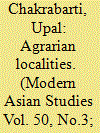

|
|
|
|
|
| Summary/Abstract |
This article writes the agrarian history of an obscure locality, Cuttack, in early-nineteenth-century British India. In doing so, instead of exalting the explanatory power of the local, or the particular, it interrogates the category of the ‘local’ itself by demonstrating how it was assembled as the object of agrarian governance in British India through a densely interwoven network of discursive practices. I present this network as various inter-regional practices and debates over agrarian governance in British India and some methodological debates of political economy in contemporary Britain. This article argues that the governmental engagement with locally specific, indigenous forms of interrelationship between landed property and political power in British India can be more productively understood as internal to the transformed vocabulary of contemporary political economy, rather than lying outside it, amid the pragmatism and contingency of governance. Accordingly, it shows how the particularity of agrarian relations in a locality was produced out of a host of reconfigurations, over different moments and sites, of a universal classificatory grid. In the process, I question those histories of British India which, being rooted in a series of hierarchized binary oppositions, like inside–outside, abstract–concrete, or universal–particular, reproduce the rationality of colonial governance.
|
|
|
|
|
|
|
|
|
|
|
|
|
|
|
|
| 2 |
ID:
144548
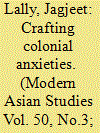

|
|
|
|
|
| Summary/Abstract |
In the early twentieth century, the Salvation Army in British India transformed its public profile and standing, shifting from being an organization seen by the state as a threat to social order, to being partner to the state in the delivery of social welfare programmes. At the same time, the Army also shaped discussion and anxieties about the precarious position of India's economy and sought to intervene on behalf of the state—or to present itself as doing so—in the rescue of India's traditional industries. The Army was an important actor in debates about the future of traditional industries such as silkworm rearing and silk weaving, and was able to mobilize public opinion to press provincial governments for resources with which to try to resuscitate and rejuvenate India's silk industry. Although the Army's sericulture initiatives failed to thwart the decline of India's silk industry, they generated significant momentum, publicity, and public attention, to some extent transforming the Army's standing in British India and beyond.
|
|
|
|
|
|
|
|
|
|
|
|
|
|
|
|
| 3 |
ID:
144558
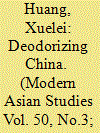

|
|
|
|
|
| Summary/Abstract |
Smell is deeply meaningful to human beings. Often considered elusive, ephemeral, and volatile, it has long been excluded from scholarly accounts on culture and history. This article explores this ‘lower’ sense and the roles it played in the historical process of modernization in China. Through a close look at the efforts made by the Western colonial administration to deodorize Shanghai as well as diverse Chinese reactions, this article argues that smell constituted a hidden site where the dynamics of power relations were played out. Smell also opened up a window to showcase modernity's power and ambivalence. The first part of this article looks at how China smelled to the Western nose, against the historical background of the rising consciousness of smell, sanitation, and civility in Europe which began in the eighteenth century. The second part examines the ways in which the British administration applied the olfactory norms of the modern West to the end of taming Chinese stench. The final part provides a case study of ordure treatment in order to show how ambivalence arose in this modern smellscape and why.
|
|
|
|
|
|
|
|
|
|
|
|
|
|
|
|
| 4 |
ID:
144550
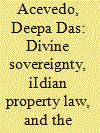

|
|
|
|
|
| Summary/Abstract |
Secular governance in India was meant to have incorporated religion within public life, but the implementation of ‘Indian secularism’ has in important ways been premised on separating religious and secular lifeworlds. Public Hindu temples, whose assets and operations are managed by a melange of statutory bodies, courts, and state governments, exemplify this puzzling situation. The 2011 discovery of treasures within the Padmanabhaswamy temple in Trivandrum, Kerala, prompted extended public debate about the ownership of temple assets as well as litigation that eventually reached the Supreme Court of India. Indian citizens, erstwhile princely rulers, and the deity of the temple were variously presented as the true owners of the wealth. Ultimately, both public discourse and judicial opinion largely reaffirmed the notion that religious institutions are to be treated as private, contractually defined properties, and that temple wealth, as specifically religious property, exists outside of market circulations.
|
|
|
|
|
|
|
|
|
|
|
|
|
|
|
|
| 5 |
ID:
144557


|
|
|
|
|
| Summary/Abstract |
This article explores the acceptance of Marxism by a non-Marxist Chinese philosopher, Feng Youlan, before and after 1949. Previous studies have largely focused on establishment intellectuals in the study of Marxism and intellectuals in China, and this article seeks to fill the lacuna on the intellectual potential Marxism offered to non-Communist intellectuals in China. This article finds that for Feng Youlan, a non-Marxist Chinese intellectual, Marxism was able to provide meaningful venues for his attempt to modernize Chinese knowledge and transform Chinese culture. A Marxist emphasis on universal rules governing all human societies on the same stage of development, Marxist presentist approaches to history, and most of all, a Marxist emphasis on praxis, aided Chinese intellectuals like Feng in constructing new approaches to learning the Chinese past. The Marxist emphasis on praxis helped deepen the discussion of experience, a concept central to a reconstruction of Confucian learning in modern China, after the Communist takeover of China in 1949. Eventually the state monopoly of the definition of Marxist praxis stifled the spontaneous search for a new understanding of experience in Communist China. Nonetheless, Marxism had a transformative and lasting impact on modern Chinese scholarship, as seen from the example of Feng Youlan.
|
|
|
|
|
|
|
|
|
|
|
|
|
|
|
|
| 6 |
ID:
144554
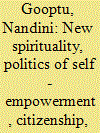

|
|
|
|
|
| Summary/Abstract |
India has seen a recent upsurge in spiritual practices promoted by an entrepreneurial breed of leaders and organizations. Their primary preoccupation is not to preach religious faith and belief or to promote ritual practice, but to provide guidance on psychological and physical well-being, happiness, and a healthy lifestyle. They offer strategies for healing and re-energizing, and advocate self-management and self-development as tools of both material advancement and mental contentment. Spiritual practices emphasize individual agency, personal empowerment, and reliance on one's own ‘inner’ resources, and valorize the autonomous, self-governed citizen as the protagonist of a modern and modernizing nation. While being reminiscent of the sacralization of everyday life and the rise of the ‘self-ethic’ in New Age spiritual movements in the West, Hindu versions of new spirituality in India draw upon religious traditions and construct a narrative of laicization of the esoteric and people-centric spirituality, consonant with the prevalent democratic zeitgeist. This article explores the implications of these developments for political subjectivity, religious identity, and notions of citizenship and democracy.
|
|
|
|
|
|
|
|
|
|
|
|
|
|
|
|
| 7 |
ID:
144555


|
|
|
|
|
| Summary/Abstract |
In the years immediately following independence, India's political leadership, assisted by a network of civic organizations, sought to transform what, how, and how much Indians ate. These campaigns, this article argues, embodied a broader post-colonial project to reimagine the terms of citizenship and development in a new nation facing enduring scarcity. Drawing upon wartime antecedent, global ideologies of population and land management, and an ethos of austerity imbued with the power to actualize economic self-reliance, the new state urged its citizens to give up rice and wheat, whose imports sapped the nation of the foreign currency needed for industrial development. In place of these staples, India's new citizens were asked to adopt ‘substitute’ and ‘subsidiary’ foods—including bananas, groundnuts, tapioca, yams, beets, and carrots—and give up a meal or more each week to conserve India's scant grain reserves. And as Indian planners awaited the possibility of fundamental agricultural advance and agrarian reform, they looked to food technology and the promise of ‘artificial rice’ as a means of making up for India's perennial food deficit. India's women, as anchors of the household—and therefore, the nation—were tasked with facilitating these dietary transformations, and were saddled with the blame when these modernist projects failed. Unable to marshal the resources needed to undertake fundamental agricultural reform, India's planners placed greater faith in their ability to exercise authority over certain aspects of Indian citizenship itself, tying the remaking of practices and sentiments to the reconstruction of a self-reliant national economy.
|
|
|
|
|
|
|
|
|
|
|
|
|
|
|
|
| 8 |
ID:
144556


|
|
|
|
|
| Summary/Abstract |
Govardhanram Tripathi wrote the four-volume novel Saraswatichandra as an ‘instruction manual’ for a people facing fundamental social and political change during colonial rule. This article examines a shift in the conception of instruction as the text progressed through its instalments—from a notion of learning as a process of deliberation about, and experimentation with, imitable actions, to the idea of education through the representation of action—a transformation that is made conspicuous by the discordance between the widely debated and highly influential initial volumes and the largely ignored final volume. It situates this shift in broader changes in the idea of instruction in Indian society, and investigates it in order to better understand the strains involved in attempting to codify or theorize certain types of domains.
|
|
|
|
|
|
|
|
|
|
|
|
|
|
|
|
| 9 |
ID:
144552


|
|
|
|
|
| Summary/Abstract |
Late eighteenth-century colonial agrarian and judicial reforms had a direct impact on women from elite and non-elite backgrounds. Informed by British liberal ideologies and upper-caste Brahmanical norms, colonial policies marginalized women's access to, and control over, resources in the emergent political economy. In this article, I reconstruct histories of the ways in which Anglo-Hindu law compromised women's status as heirs, businesswomen, and members of society who wielded social capital with other community groups. Focusing on widows in Banaras who commandeered their property disputes, I illustrate that pre-colonial precedents of case-resolution under the Banaras rulers, and practices of ‘forum shopping’ by disputants themselves, shaped the widows’ approach to the colonial courts. Colonial judicial plans being incommensurable to everyday life, the courts incorporated pre-colonial forms of dispute handling and maintained a flexible approach to the practice of colonial law under the supervision of an Indian magistrate for a period of time. These characteristics made the courts popular among local society in the Banaras region. However, British officials, insistent on applying abstract scriptural laws, aligned customary practice to the dictates of Anglo-Hindu law. This article shows that the narrow legal subject position available to widows under scriptural law reordered their relationships with family and community networks to their disadvantage.
|
|
|
|
|
|
|
|
|
|
|
|
|
|
|
|
| 10 |
ID:
144549


|
|
|
|
|
| Summary/Abstract |
This article traces the consilience of science and mythology in the history of fossil research in India: this is a narrative in which Indian fossil research met the Orientalist discovery of the Indian past. It demonstrates that in exploring the geological evolution of Indian fossils, British researchers such as Hugh Falconer invoked animals from the Puranas, picking up on a tradition of mythological hermeneutics first developed in India by the likes of William Jones. In exploring the nuances of this intellectual approach, the article thus identifies a hitherto obscured historical trajectory regarding the making of geology in colonial India.
|
|
|
|
|
|
|
|
|
|
|
|
|
|
|
|
|
|
|
|
|